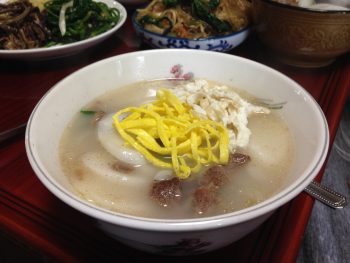Celebrating Korean Lunar New Year’s Day Posted by Kyung-Hwa on Jan 25, 2017 in Korean Language
One of the most celebrated Korean holidays is around the corner. Do you know when Korean Lunar New Year’s day is?
새해 복 많이 받으세요! (Happy New Year!)
Although many countries around the world celebrate January 1st as the beginning of a new year, traditionally many Asian countries like Korea, China, Thailand, and Singapore, have observed Lunar New Year’s day (January 1st of the lunar calendar). This holiday usually falls anywhere between the end of January and the end of February each year. In 2017, Lunar New Year’s day falls on January 28.
Korean Lunar New Year’s day is called 설날. People usually take three days off for the celebration: the day before 설날, the day itself, and the day after설날. 설날 is one of the most significant holidays in Korea: it is not only a day to mark the beginning of a new year but also a day to celebrate with living family members and remember their ancestors. Family members will have an opportunity to catch up with each other, eat lots of delicious homemade food, and have a rite for their ancestors. People will also wear colorful traditional costumes called 한복.
What to eat
Since 설날 (Korean New Year’s Day) is centered with family gathering, there are many mouth watering dishes that Koreans eat on설날 아침 (Lunar New Year’s morning): such as variety of 전 (Korean style pancakes with meat or vegetables), 갈비찜 (braised short ribs), 잡채 (Korean sweet potato starch noodles with meat and vegetables), special vegetable dishes, and so on. However, the highlight of the 설날 dish is 떡국 (rice cake soup). It is the first meal of the year that Korean people eat with their family. 떡국 is made with thinly sliced rice cake in a beef broth with beaten eggs and vegetables. In Korean tradition, you will get one year older by eating a bowl of 떡국. As children, my cousins and I used to engorge ourselves with 떡국 to see who will become the oldest among us. Not just children, even adults like to joke around by comparing how many bowls of 떡국 on 설날.
What to do
In the morning of 설날, family members will have a rite to pay respect to their ancestors with food and deep bows. This ancestral ritual is called 차례. After 차례, family members will gather around the table to eat 떡국 and other dishes together. After the meal, younger generations, especially children, will pay respect to older family members. While taking a deep traditional bow called 세배, they will say 새해 복 많이 받으세요! (Happy New Year!) to their grand parents, parents, uncles, and aunts. These elders will offer children 덕담 (words of wisdom) and 세배돈 (New Year’s money that are crisp and brand new bills).
I hope you will enjoy this fun YouTube that explains about 설날 and some expressions in Korean.
설날 is one of my favorite Korean holidays because it offers a great opportunity to catch up with family members who live far away from each other, most of all I love sharing 떡국 and other delicious Korean dishes with my loved ones.
감사합니다! (Thank you!)
***Related Vocabulary***
- 새해 복 많이 받으세요! (Happy New Year!)
- 설날 (Lunar New Year’s Day)
- 한복 (traditional Korean costumes)
- 설날 아침 (Lunar New Year’s morning)
- 전 (Korean style pancakes with meat or vegetables)
- 갈비찜 (braised short ribs)
- 잡채 (Korean glass noodle with meat and vegetables)
- 떡국 (rice cake soup)
- 차례 (ancestral ritual)
- 세배 (deep traditional bow to elders on New Year’s Day)
- 덕담 (words of wisdom)
- 세배돈 (New Year’s money that are crisp and brand new bills)

Build vocabulary, practice pronunciation, and more with Transparent Language Online. Available anytime, anywhere, on any device.





Comments:
Kyung-Hwa:
@한국어를 공부해요. | egy k-drama addikt feljegyzései...
안녕하세요? (Hello?)
새해 복 많이 받으세요! (Happy New Year!)
Good luck with your Korean Studies *^^*